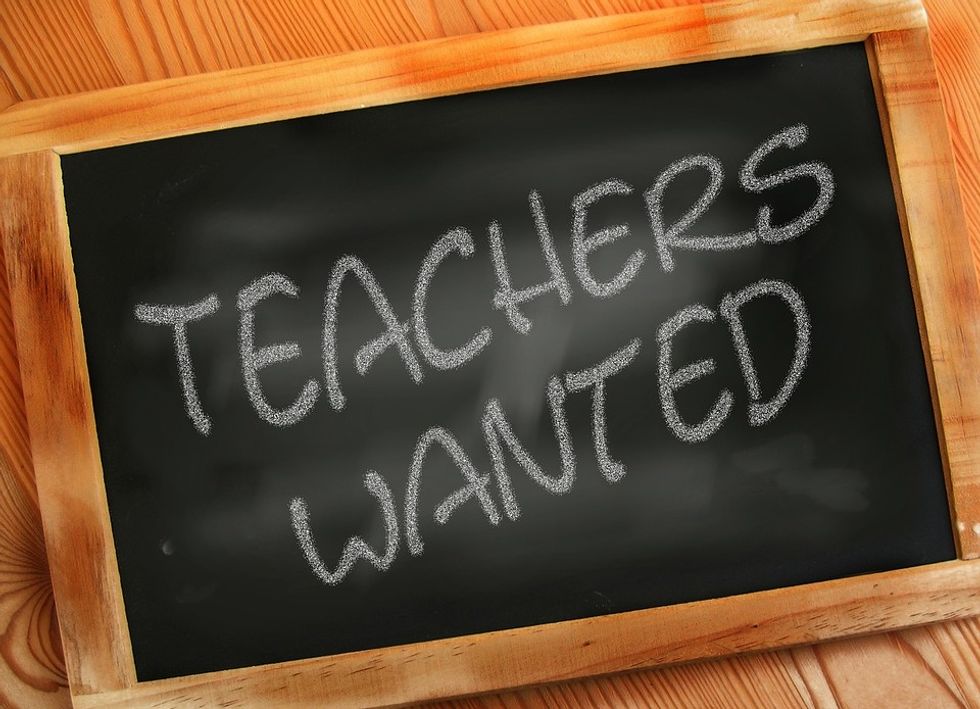I had a discussion with a lady about our education system last week.
Her name was Katherine. A former teacher at an Arizona High School, Katherine was well qualified with 2 bachelor's degrees: One in geology, the other in history. She received both and a master's degree from Princeton University. Her starting salary was $23,000 and she had to pay for classroom supplies and field trips out of pocket.
Katherine's experience is not an isolated incident, in fact, her story is a summation of the American teacher narrative. In "The Greatest Country on Earth" our educators, the very individuals who intrigue, influence, and inspire the future of America, are provided with the bare minimum. Our educators' disparities are not limited to their pay: Classrooms are not equipped with basic resources, school infrastructure is not kept up, and many schools across the country, primarily in high minority regions, are being shut- down.
Teacher detriments coincide with student disadvantages. Access to extracurriculars are being rolled back, preventing expression and individuality, parents and students are burdened with paying for sports programs, and fundamental curriculum is being dumbed-down in public schools. The system is preventing students from finding their niche. Schools, seen as centers for communities are not providing students, teachers, and community members with a place to express themselves, grow, or enjoy events such as sports, concerts, art shows, and plays.
This is by no means the fault of school districts or schools themselves; If school districts had the funding to support and expand their educational and extracurricular programs, we would see a more diverse curriculum, students would have the ability to experiment and engage in skill building through fine arts or sports. The blame for unsatisfactory educational institutions falls on the individuals who influence policy. It falls on state and federal spending, and it falls on the shoulders of an education secretary who lacks the experience, the credentials, and common sense to run a successful public education system. The solution is not to privatize education. In fact, there is little evidence that supports the claim that private or charter schools perform better than public schools.
https://www.youtube.com/watch?v=vcGANYbxyRI.
The solution, rather, is to invest in our future, invest in our students, provide the youth with a platform to learn about, not only the basics to earn a high school diploma, but skills that will benefit students as they embark on their journey beyond the classroom. Let's put resources in schools that actually prepare students for life after high school, whether they are entering the workforce, military, community college, or a university.
In a country where our military budget is just under $700 billion, more than the next 7 countries combined, and with an education budget of just $40.8 billion, it seems that we do not have our priorities straight.
I come from a military family and I support our military and the men and women who keep our country safe 100%, but I also grew up in a household dominated by educators. I am a product of America's public education system, and I feel as though our teachers, administrators, and classified staff deserve more than, what amounts to, a minimum wage paycheck.
As I grow and learn more about how our American society functions, I have learned a few important lessons:
- 1.The United States is a large community made up of smaller, complex communities with individual histories that Americans do not fully understand.
- 2.We are still grappling with the implications of biased policies and actions that date back to the development of our country.
- 3.As a whole, we do not trust the individuals that lead us.
I feel like these lessons or problems, depending on how you look at them, can be discussed in classrooms. Moving forward, we have to be honest with ourselves and look deeper into the issues that we face in our communities. Schools can be the space that challenges our students and educators to confront our faults.
They can be community centers and places of collaboration and recreation. We just need to give our schools a chance to grow.
As we celebrate Nelson Mandela's 100th birthday this week, I believe it would be appropriate to leave you with a quote by Nelson Mandela:
"Education is the most powerful weapon which you can use to change the world."
- -Nelson Mandela











